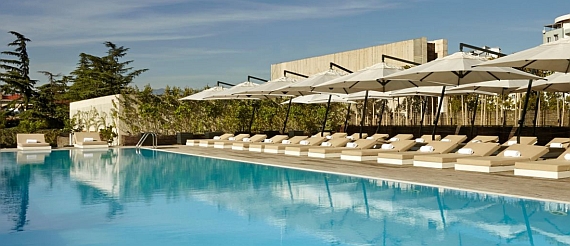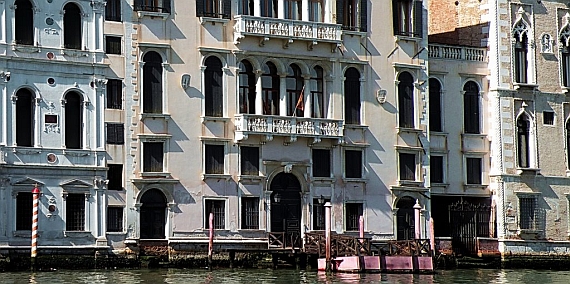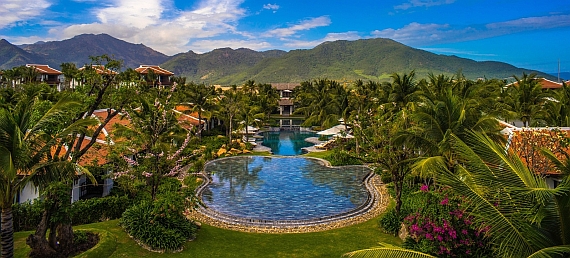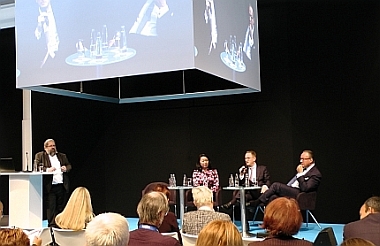
News & Stories
Vienna. Europe's hotel industry is growing across the board, but Eastern Europe in particular provides impetus. "The motor is a healthy mix of high occupancy and high revenue per available room, above all in Central and Eastern Europe", Thomas Emanuel summarised, Director Business Development of STR, speaking last week in Vienna at the 10th IHIDCF. He presented current performance figures, supplemented by investment and transaction benchmarks from Simon Kronberger, Senior Consultant at Christie & Co in Vienna. An overview.
Munich. Ten castles in 30 hours: This was the start of the theme journey for the creators of the new 25hours hotel in Munich. Yesterday and today, The Royal Bavarian celebrated and is still celebrating glittering opening parties at the former "Royal Bavarian Telegraph Central Station". A funny and charming splash of colour in the "ambivalent world" of the central station, as CEO Christoph Hoffmann put it.
Rome. Not everybody is interested in Venice, Milan, Florence or Rome. Operators and investors are focusing everywhere along the peninsula, including destinations such as Naples and the Amalfi Coast, as well as entire regions like Apulia, Sicily and Sardinia. A growing trend well supported by Italy's positive tourism performance and nice financial basics. On the other side of the coin, criticalities remain more or less the same: a certain degree of market opacity and local rules that are never the same in any destination.
Cam Ranh. 3,000 palms at the hotel facility of the brand new The Anam in Cam Ranh in Vietnam: The lush Bermuda grass stands in contrast to the light-coloured, wide sand beach. Numerous gardeners with pointed coolie hats tend to the grass. Four fishing boats bob up and down in the water in front of the resort. At the resort, an Austrian citizen is in charge: Herbert Laubichler-Pichler. The 59-year-old, born in Radstadt, is the General Manager of the newly opened luxury hotel The Anam – and has to cope with similar challenges concerning staff just as in Europe. In the meantime, close contacts and university co-operations have been established between Vietnam and Austria. The demands are increasing in Asia – concerning everything. Even chefs should be academics now.
London. From Turkey to Switzerland, OTAs are under pressure across Europe, and England is the latest country to take a closer look at their practices. Last Friday, UK's Competition and Markets Authority launched an investigation into hotel booking platforms.
Barcelona. Suffering from tourist disturbances, Barcelona often let the world know that the locals want fewer visitors. Now, holidaymakers are avoiding the destination due to the political fight for independence. Revenues and hotel bookings are decreasing. Investments are being put on ice.
London. The meetings & events industry can be optimistic about growth prospects next year, driven by increased competition in the supply chain for market share, and robust investments and a desire for consolidation of spend by buyers.
Munich. Nothing can daunt investors anymore: not excessive rates not a scarcity of properties, not low interest rates or decreasing yields. Real estate bubble? Real estate boom! Hotel bubble? Hotel boom! The Expo Real 2017 moved between basic trust and gut feeling. The bubble will come, but when? Until then, everything continues as usual, driven by flows of capital from all over the world, which – seemingly – all have one target in Europe only: Germany! "Germanomania" is quickly becoming a buzzword in the industry. However, there are also cautioning voices. The hotel industry is turning the real estate wheel too, the asset class is becoming increasingly popular. An atmospheric picture, spiced with figures.
Augsburg. In today's edition, "hospitalityABC" addresses the term "No-show". Explained by Christian Buer, Professor for International Management and Tourism Management at Heilbronn University and our hotel management expert.
Munich. With an urgent appeal to "see China differently", four top China experts attempted to convince Expo Real visitors that the strategy of Chinese partners may be difficult to comprehend, but is not to be viewed negatively. The podium of the hotel conference "Hospitality Industry Dialogue" at the Expo Real brought together experts from Deutsche Bank Wealth Management, CBRE London, and from Kempinski Hotels. The discussion was hosted by renowned China expert Prof Wolfgang Arlt, Managing Director of China Outbound Tourism Research Institute. You all know: Investors continue to place their capital in the west – despite all current government restrictions. This is also true of the hotel industry.






